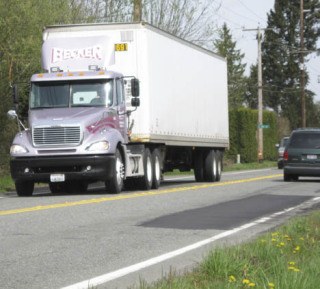When the state Legislature eliminated the Motor Vehicle Excise Tax (MVET) in 2000 in response to a voter initiative, the City of Auburn lost its main revenue source to maintain truck routes.
But it was left with the responsibility of doing so.
As a result, some of Auburn’s main freight corridors are falling apart under the constant coming and going of big trucks, and there’s no money in the purse to fix them.
City officials recently considered a tax on each warehouse door to create a permanent revenue source from the very companies that send those trucks out. But recognizing that the current recession might not be the best time to ask struggling businesses to pony up, city officials shelved the idea.
Without money to repair and maintain the crumbling corridors, the best the City can hope to do is to stick a Band-Aid on the wound.
The city’s Public Works Committee is considering one such measure. City Councilman Rich Wagner, chairman of the Public Works Committee, said the proposal would be to close at least two of the most degraded corridors, West Valley Highway north of Highway 18, and B Street Northwest, to all but local truck traffic until the City can come up with a permanent funding source.
Committee members are expected to discuss the idea at 3 p.m. Monday in the Council Chambers at City Hall. The measure could go before the full City Council at 7:30 p.m. the same day.
Wagner said one question is whether closing these routes to all but local trucks would help.
“We have asked staff for information about the mix between between local trucks and trucks trying to avoid a jam on 167 by taking routes parallel to Highway 167,” Wagner said.
The Public Works Committee also will discuss whether Mayor Pete Lewis could close the routes without council action or if an ordinance would be required and how the city actually would block the routes to big trucks.
“What we are really doing is taking this back to our Council and saying, ‘Here is the current condition of our roads,'” Lewis said. “If we take the certain list of potential closures we are looking at and change them from truck routes so we don’t have to keep them at the same high standards a truck route demands, then we can have them in reasonable condition for our citizens to use until such time as we get an ongoing stream of funds for repairs.
“This is serious,” Lewis added. “We have lost all ongoing funds for these big truck routes, so everything is put on hold. In the meantime, we are an industrial city that has the freight of the region moving through without a method for restoring those freight routes. Our first and primary task is to care for our citizens.”
The movement of freight is a major concern to Port of Seattle Commissioner Bill Bryant. The Ports of Seattle and Tacoma over the last 10 years have invested more than $2 billion building internationally competitive marine terminals, Bryant said, and as a result they have the capacity to double the volume of trade coming through Puget Sound.
“We as a state have not made a commensurate investment in our transportation structure,” Bryant said. “The competitiveness of Puget Sound ports depends on our ability to move freight to the Midwest, to Chicago or St. Louis faster than Los Angeles or British Columbia. And if the freight comes to Puget Sound but spends extra hours or days getting out of Seattle or Tacoma or getting through the Kent Valley distribution center, out of town, and over the Cascades on its way to the Midwest, we will lose that edge.”
And that could mean job losses, Bryant said.
“Let’s say the ports are responsible for more than 40,000 maritime jobs in King and Pierce County, jobs that pay well over $50,000 a year. If we were to slowly have the ports of Puget Sound atrophy and lose business to British Columbia or Panama. there’s no other company we could attract to Washington state that would hire that many people at those salaries. So we need as a state to begin focusing on developing a transportation system that matches our port capacity. That’s something that the ports of Seattle and of Tacoma and many people in north Pierce and south King County are talking about. That’s why maintaining freight routes is so important.”
Bryant noted that the ports are being asked to help finance road bridge overpass projects. Two weeks ago. the Port of Seattle voted to spend $18 million to fund overpasses on East Marginal Way. On Tuesday, commissioners voted to spend just under $2 million to help finance overpasses in Kent over the railroad tracks.
“Those projects are important to us all, a key part of moving freight. The ports don’t have the resources to fund all the projects that need to be funded. Just as the City of Auburn is looking for a way to come up with funds to maintain its transportation routes, we want to help, but our resources are limited. Again, as a state, we need to look at how we finance our transportation system. The problem is the lack of sustainability in the finance system. We’ve made some changes in the tax system on a piecemeal basis without a good understanding of how that affects the overall system. There has to be a solution. Too many jobs depend on it,” Bryant said.
“We sure sure wish it would get more attention from Olympia,” Wagner said.



